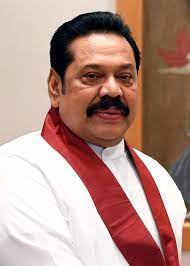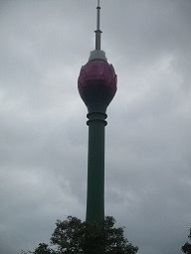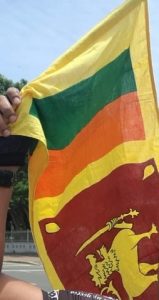
From wikipedia.org / © Prime Minister’s Office
In late February this year, I moved from Sri Lanka to Singapore. It’s fair to say, though, that Sri Lanka still occupies most of my headspace. The country has made the headlines lately for all the wrong reasons and I’m constantly visiting the websites of Sri Lankan news outlets, following events on Sri Lankan social media, getting WhatsApp messages from friends still living in Sri Lanka and discussing the situation there with Sri Lankans I know in Singapore. It will definitely be some time before I switch to a Singaporean frame of mind.
The crisis in Sri Lanka supports Ernest Hemmingway’s famous assertion that things first develop ‘gradually’ and then develop ‘suddenly’. During the second half of 2021 it was apparent that, slowly but surely, the country was going off the rails. Inflation had been an issue for a long time – I can think of many commodities that, within a couple of years of my arrival in Sri Lanka in 2014, had doubled in price – but even by recent standards prices were surging upwards. Also creeping up relentlessly were fuel prices, one symptom of which was the constant upping of fares by the country’s army of tuk-tuk drivers.
Then there was the exploding gas-canister phenomenon. From the start of November until the middle of December 2021, almost 730 canisters had exploded, often in people’s kitchens. The majority of these had been bought from Sri Lanka’s state-run Litro Gas Lanka Ltd but nobody, company executives or politicians, seemed in a hurry to take responsibility or hold someone else responsible for the carnage. I heard rumours that Litro had changed the make-up of the canisters’ contents to cut costs, inadvertently making them dangerously volatile. For a time, Litro and the other main supplier, Laugfs, had to stop selling their normal canisters and only sell ones that’d been approved by the country’s Standards Institute, which caused the gas supply to dry up. This wasn’t ideal in a country where just over 40% of the population used the stuff and nothing else for cooking.
And then there was the fertiliser fiasco. In April last year, the government banned all chemical fertilisers, plus pesticides, weedicides and fungicides, for the supposed purpose of converting Sri Lanka’s two million farmers to organic farming – overnight, apparently. While this attempt to make the agricultural sector ‘go green’ might seem a noble, if fatally rushed and over-ambitious, undertaking, the Sri Lankan rumour mill suggested darker reasons for why the government did this – namely, that it was a ploy to make thousands of farmers bankrupt, so that powerful interests could buy up their land at reduced prices. Whatever the real reason for it, the policy had quick, tangible but negative results. By October, food inflation was at nearly 12% and experts were predicting the output of the country’s paddy fields to drop by 43% in 2021.
With hindsight, I realise I left Sri Lanka near the end of the ‘gradually’ part of the process whereby things went tits up. The ‘suddenly’ part happened a few weeks later. That was when the country was stricken by power cuts lasting many hours and its fuel supplies ran out, due to it having no more revenue to pay for imports. The weeks after my departure was also when mass protests began against the government. These protests culminated in the Rajapaksa clan being chased out of office and last week, in the case of the Rajapaksa who’d been president, chased out of the country.
Ah, the Rajapaksas. Living in Sri Lanka for the last eight years was like living in a beautiful house with a beautiful garden and beautiful views, but with dodgy drains. The Rajapaksa dynasty were like a bad smell from those drains, sometimes faint, sometimes severe, which never wafted away.
When I arrived in 2014, Mahinda Rajapaksa had been president for nine years. In November 2005, during the later years of the Civil War between government forces (representative of the Sinhalese majority) and the northern-based Liberation Tigers of Tamil Eelam, aka the Tamil Tigers, he’d taken power after winning an election with a slim majority of 190,000 votes. He was fortunate that the Tamil Tigers forbade the Tamil people, who’d have definitely voted against him, from participating in the election. It was as if the Tamil Tigers had wanted a Sinhalese-nationalist hard man like Rajapaksa to win. There’d be no pussyfooting around. There’d be a bloody fight, all Tamils would rally to the LTTE’s cause and hopefully, with Rajapaksa hammering at them, they’d win more international sympathy and support.
If that was the calculation, they got the fight they wanted but not the end-result. By 2009, the Sri Lankan military had crushed the Tigers in the country’s northeast and Rajapaksa could declare victory. Ignored, hushed-up and forgotten in the rush to celebrate the war’s end was the civilian death toll in the zone where Rajapaksa’s forces had wiped the Tigers out. According to the United Nations in 2011, troops slaughtered some 40,000 people there, and that’s one of the more conservative estimates.
Among those demanding that the Sri Lankan government investigate its military for war crimes was Britain’s then-British Prime Minister David Cameron, who raised the issue at a Commonwealth summit in 2013. Rajapaksa did not take this well and I suspect it contributed to the long, long wait I had subsequently before I could get a visa to live and work in Sri Lanka. I have British and Irish passports, but the British passport was the one I applied for a visa with, and British passports weren’t flavour of the month at Colombo’s immigration office. As is usually the case when Britain criticises its former colonies, Cameron’s criticism came with a large dollop of irony. It was Britain, in its role as imperial overlord, that gave the Rajapaksa clan their first opportunity to shimmy up the greasy pole of Sri Lankan national politics. In 1936, Don Matthew Rajapaksa, Mahinda’s uncle, was elected to the State Council of Ceylon, which the British had set up based on the model of London County Council.
As a foreigner, life in Sri Lanka was superficially pleasant, but I wasn’t there long before I became aware of things going on behind the scenes that you’d associate with bullying, semi-authoritarian, ‘strong-man’ regimes such as Erdogan’s Turkey, Orbán’s Hungary and Bolsonaro’s Brazil – discrimination against minorities, intimidation of journalists and so on. Meanwhile, Rajapaksa’s face was ubiquitous. It wasn’t quite George Orwell’s 1984 and ‘Big Brother is Watching You’ but you sometimes wondered if the place was setting off along that road. I particularly remember seeing billboards depicting the president, plump, moustached and clad in a white jathika anduma, while he grasped the wheel of a ship.
It seemed appropriate that his birth-name was Percy Mahendra Rajapaksa. He definitely looked like a Percy. In fact, he reminded me of a well-fed Terry-Thomas, the comic actor who’d specialised in playing upper-class cads, bounders and scoundrels in old British movies, including one called Sir Percy Ware-Armitage in Those Magnificent Men in their Flying Machines (1965).

But Percy, sorry, Mahinda Rajapaksa wasn’t a one-man band. He had three siblings who were also politicians: younger brother Gotabaya, a former military man who’d served as Secretary to the Ministry of Defence since 2005; younger brother Basil, who’d been Minister of Economic Development from 2010; and older brother Chamal, who’d been Speaker of Parliament from 2010 too. Needless to say, holding such power, and with few, effective systems in place for public accountability, the family were in a position to squirrel large sums of government and party money away into their own bank accounts and businesses. Meanwhile, money that was spent in public view was often borrowed and shovelled towards self-aggrandising white-elephant projects. These included the Colombo Lotus Tower, commissioned in 2012 and finally opened in 2019. Meant to represent a sacred lotus flower, I always thought of that tower as ‘the hand-grenade on a stick’.
The billboard depicting Mahinda Rajapaksa at the helm of a ship reflected the fact that another election was coming up. In late 2014, as the election neared, I was running a training course on Colombo’s Duplication Road. One day, for five minutes, the training was disrupted by a cacophony of revving engines and blaring horns outside the building. This came from a procession of motorcyclists and tuk-tuk drivers, many with Sri Lankan flags fluttering from their vehicles, who were driving by in a stage-managed rally to show support for their beloved President Rajapaksa. A Sri Lankan trainee explained to me that the rally would wind up at one of Rajapaksa’s residences, where the drivers would be treated to free grub and arrack. “And that,” she concluded bitterly, “is what our taxes get spent on.”
As it turned out, thanks to some wily manoeuvring by Maithripala Sirisena, who’d served as Rajapaksa’s Minister of Agriculture and then Health, the plump, moustached incumbent-president lost the election. Sirisena replaced him in the presidency. Sri Lankans I knew reckoned Sirisena had squeezed ahead of Rajapaksa thanks to the combined support of the country’ ethnic and religious minorities – Tamils, Muslims, Christians – and the more liberal-minded citizens living in Colombo. My experiences bore that out. When I was in the countryside of central and south Sri Lanka, where people were more conservative and Singhalese nationalism was more of a thing, the tuk-tuk drivers would regularly drop Rajapaksa into their conversations and tell me what a great guy he was. The tuk-tuk drivers who took me to and from work in Colombo every day were less willing to gush about the topic of Rajapaksa’s greatness.
Power was handed over peacefully, though later there were allegations that once he’d realised the game was up, Rajapaksa attempted to do a Trump and trigger a coup. The military, however, wouldn’t play ball. Soon afterwards, Pope Francis came to visit Sri Lanka and told everyone how wonderful they all were. The feel-good factor was high. Folk were full of optimism, and felt not a little relief. Surely a corner had been turned.
Would it last? Of course not.

© Lilith & Cupid Studios
To be continued.
